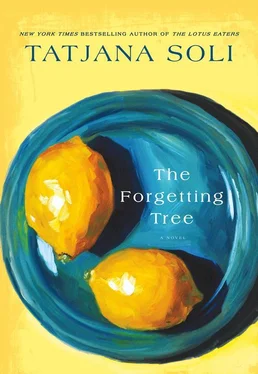He would arrive and open his rented apartment that remained empty and locked against her while he was gone. Each day when he left, he turned the key from the outside, imprisoning her no matter how she argued that she would like to take a walk or visit with a friend. When he returned, he filled a washbasin with warm, soap-filled water and motioned Marie over. He bathed her as gently as a mother: her feet, her elbows, behind the ears, although she had already made herself clean for him. Then he would have her spread her legs apart, and he would rub only there, and at that moment he changed into lover. He brought her food, delicious food, and took pleasure in watching her eat, sometimes feeding her himself, but each day he brought less, so that finally Marie was starving even as she ate.
She could have tried to jump out the window, but she would only have succeeded in breaking her neck. And what was she escaping to? She could have pounded and yelled at the door, but the crafty landlady was against her. People’s hearts tend to understand the side with money, the side that pays the bills. What is another young, ruined girl, after all?
* * *
Often the Frenchman drank in the small room, and the alcohol would make him homesick for Cannes, for his wife and two boys.
“Why don’t you stay home then?” Marie pouted.
He narrowed his eyes at her, as if considering the implications of the question. “Because I never love them as much as when I am here.”
“ Tanpi , too bad,” she said, smirking, and then he would hit her. It always ended like this, and so after a while she found herself hurrying to this point to get it over.
Afterward, he would be filled with remorse and passion. His eyes would tear, and he would give her extra gourdes to buy herself something nice. “You don’t understand, ma petite nègresse . I’ve never loved anyone like I love you.”
Marie wondered at the horror of this being true.
One time only the Frenchman took her on a trip out of the capital. They traveled to the coast, to a resort on the beach where one of his UN buddies was giving a party. Marie was excited because this appeared a step in making their relationship public and permanent. He parked the car in a gravel lot with a long dirt track to the beach, fenced jungle on either side so the locals were kept out.
As they walked, small girls appeared from behind the trees and pressed against the fence, holding bunches of bananas. When the Frenchman came close, they began their chants: “Baa-naaan-nan. Baaa-nan-naan.” Up and down the road they sang like birds, small girls who reminded Marie of herself at seven or eight years old. Would they, too, eventually become the girls moaning and pleading in the dark along the Champs de Mars?
The Frenchman laughed and pointed, thinking their hawking charming, but Marie shook with fury. She hissed at them, “ Pe la! Shut it!” But of course the girls saw her nice dress, her well-fed stomach, and wanted that for themselves, ignoring her.
Finally the Frenchman chose an especially scrawny girl who looked half-starved and bought the largest bunch she had. When they arrived at the resort, a crowd was out on the terrace dancing. Most of the men were European; all the women were black.
“I’ve brought the banana girl,” the Frenchman announced as Marie carried the bunch in behind him.
She burned with humiliation, but she could do nothing. All eyes were on her, expectant, so she lifted the bananas on top of her head and danced slowly around the floor, pulling off and handing a banana to each man and woman she passed. The Frenchman clapped, delighted, but Marie understood she was nothing more than those girls standing in the dirt.
* * *
When the Frenchman wasn’t around, she often went to her father’s abandoned house. In its cloistered emptiness, she tried to see a future that wasn’t the obvious one she was headed toward. She tried to recall the days spent there with Jean-Alexi, the only bit of happiness she could summon. When the Frenchman returned to the island the next time, she wore her best dress, and as soon as he had a few drinks, she broached her plan.
“I’d like to go to France.”
“Yes?”
“Could you help me? I want maybe to be a teacher, like my maman .”
“A teacher doesn’t have a pute for a daughter.”
She wanted to slap him across the face, but she knew it would cost more than the momentary satisfaction was worth. “That’s the problem with you people. You believe history only moves in one direction. Sometimes it slides backwards, sometimes it just gets mashed up.”
“I like you right here. Waiting for me.”
* * *
Next, Marie turned to her only other hope, Uncle Thibant. Since he couldn’t read, she hired a messenger to tell him her request — pay for her boat passage to Miami or she would come to the village and tell everyone what Tante Josie had done to her. Not only that, Marie would be sure to get her fired from the pink house. “No matter what it takes, I will ruin Tante, tell him that. But tell him I love him.”
When Uncle Thibant showed up in the capital, he looked older and more frightened than she remembered. It was his first time in Port-au-Prince. She took him out for dinner, and he fidgeted, not eating a bite. “I never knew what she done to you.”
“You knew, or you didn’t want to know. But I never blamed you, Thibant. I figure you and me are just the weak in the world.”
“I find a boat through zanmi Jean-Alexi. So they don’t steal from you, he pay at other end.”
Her heart was pounding so hard at the reality of leaving, she hardly heard him, didn’t care for the details. A good omen — Jean-Alexi would be on the other side for her.
They hugged to say good-bye. Thibant such a country peasant he insisted on sleeping at the side of the road all night to make sure he caught the first tap tap out of the capital in the morning.
“You tell Tante this is the money she owes me. This makes us square, okay?”
Uncle Thibant moved off quickly, and Marie realized with a sting it was to get away from her. No matter that she had been the one wronged. Especially in the country, people tended to condemn a person for her misfortune; it was easier that way. Thibant didn’t want proof of who Tante was. Easier to pretend when Marie was out of sight and gone.
Victim turns into monster, and they don’t want themselves to blame for it, wi ?
The horror of the boat trip was forgotten because Marie thought at last her life would change. “Change, life, change,” she chanted under her breath, to the rhythm of the waves, until the other girls thought she was singing, and they hummed along searching for the melody.
The slosh and thump of water against the boat’s hull, the constant fear of the mosquito whine of a Coast Guard boat coming to turn them back, or the equal fear that the smugglers running the boat would take advantage of the women, all vanished at the first sight of land. From far off the orange halo over the cities of South Florida looked like giant bonfires lit to signal them in. Magic names — Miami, Key West, Delray, Boca Raton — like incantations. No one waited for them, or wanted them. They stole in like thieves. But Uncle Thibant promised Jean-Alexi would be there to pick Marie up.
Grateful to have someone to take her away from the beach and the danger of police, she didn’t notice until later that he was also chatting up the other women in the group — the thin, young ones — who crowded into the back of the waiting van with her.
Behind the tatty front seats, the van was pure island, stripped out with nothing more than a filthy metal floor to sit on. At first, the most fussy of the group, those who had saved clean clothes to be worn after the landing, if there was a landing, tried to squat and preserve the impression they had struggled so hard to make — white blouses and dark, printed cotton skirts — of well-behaved convent girls. But the quick driving, the hard turns, knocked them over and into each other. Marie had to brace her legs against the side of the van to avoid landing on top of, or underneath, other bodies. They were like chickens thrown carelessly in a box on the way to the butcher.
Читать дальше












